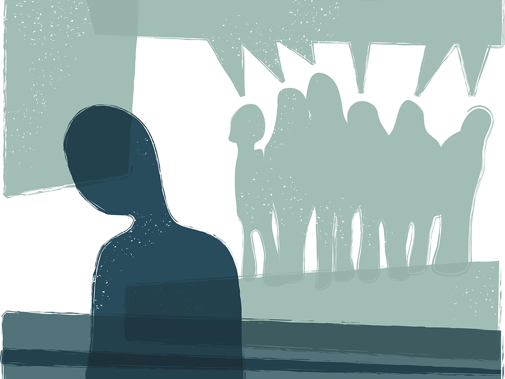Racism can be found in every part of society, with the NHS no less immune to its pernicious effects. A series of reports recently published by the BMA highlight the extent to which discrimination affects doctors’ professional lives and personal wellbeing, while also attempting to identify solutions towards tackling inequality in the health service.
With doctors from ethnic minority backgrounds now accounting for 40 per cent of all medical professionals in today’s health service, it is easy to see how the NHS could be held up as a model employer of good practice, one that champions diversity and inclusivity.
Despite the NHS owing its continued existence to minority ethnic and international doctors, new research by the BMA highlights how racial bias and discriminatory behaviour continue to have a corrosive presence at an individual and institutional level, across all parts of the UK’s health service.
No one stood up for me and I did not have the courage to speak upAsian medical student
An in-depth survey of more than 2,000 doctors and medical students carried out between October and December last year, has revealed that just over three-quarters (76 per cent) said they had experienced at least one incidence of racism in the workplace in the previous two years.
Of this total, 17 per cent said they experienced racism on a regular basis. ‘I was looking after a Caucasian male patient who noticed I was taking more time than normal to do a particular task,’ a medical student of British Asian background told the survey.
‘He commented saying “come on, you monkey man”. Other members of staff around me heard it but said nothing. In fact, one of my colleagues, a female Caucasian middle-aged lady, laughed with him. I felt horrible and wanted to curl into a ball. No one stood up for me and I did not have the courage to speak up.’
Turned off
While experiences of racism were found to be more prevalent among doctors from overseas, with 84 per cent of international medical graduates reporting instances of racial discrimination, 69 per cent of UK-trained doctors also said they had been targeted.
Fifty-eight per cent of those responding to the survey said it had had a negative effect on them either personally, professionally or both, while 23 per cent said they had considered leaving their jobs because of racism, with 9 per cent saying they had done so.
One overseas-qualified Black, African junior doctor told the survey how the constant need to prove his ability and justify his ‘right to belong’ had left him questioning his future in the NHS.
‘I have the fortune of passing as English due to my accent but … the second people find out where I studied their approach and demeanour changes regarding my competence,’ he said.
‘There are a number of colleagues that struggle more than me, but the experience is deterring me from pursuing a long-term career in the UK.’
Patients have threatened me and called me awful namesBlack GP
Fifty-four per cent of doctors from Black backgrounds responding to the survey said they had had their clinical ability doubted owing to their ethnicity, with 46 per cent of doctors from Asian backgrounds and 37 per cent of mixed-race doctors saying the same, compared with just 6 per cent of White British doctors.
‘I have been mistaken for a taxi driver,’ a consultant of Pakistani origin told the BMA. ‘I have been mistaken for a junior doctor and the White junior doctor was assumed to be the consultant. It seems to be pervasive that White doctors are assumed to be better.’
As well as assumptions made on the basis of ethnicity, many doctors told the survey they had experienced more direct forms of discrimination, from derogatory comments and behaviour to bullying.
Thirty-seven per cent of doctors from both Black and Asian backgrounds told the BMA they had been bullied because of their ethnicity, with 22 per cent of those from mixed and non-British white backgrounds saying the same.
‘[A senior doctor] said “we don’t negotiate with terrorists” as a joke but I didn’t find it funny,’ a medical student of Arab origin told the survey. ‘You are constantly made to feel different, and you are reminded every day that you are not the same as everyone even though you are just there trying to do your job.’
Iceberg of abuse
While exposing the prevalence of racism in the health service, the BMA’s survey also highlights the extent to which abusive behaviour is going under the radar, with 71 per cent of those targeted saying they chose not to report it.
Fifty-six per cent cited a lack of confidence in any action being taken as their reason for not reporting, while 33 per cent said they stayed silent for fear of being viewed as a troublemaker by their employer.
One GP of Black, African origin told the BMA: ‘Patients have threatened me and called me awful names but when I complained to the management it was trivialised and I was told I could have managed the situation better and was told to do a reflection on the encounter for my appraisal.’
In addition to a report detailing the full findings of its survey, the BMA has also published Delivering Racial Equality in Medicine. The report, which recommends a range of actions around tackling racial bias in the health service including improving racial literacy, reporting processes and increasing accountability in NHS workplaces, builds upon previous work by the BMA such as the racial harassment charter for medical schools launched in February 2020.
'Unfair treatment'
BMA council chair Chaand Nagpaul said: 'The NHS was built on the principle of equality of care for patients whoever they are but this report shows that the NHS is shamefully failing in this principle for its own doctors, with those from ethnic minorities reporting alarming levels of unfair treatment and racial inequality at work.
'Experiencing racism is extremely distressing, with 60% of those doctors surveyed reporting that their mental wellbeing had deteriorated as a result, with many suffering depression, low self-esteem and anxiety. There is evidence that incivility can affect the cognitive functioning of doctors, and consequently this is having an adverse impact on patient care.
'Worryingly, almost one third of respondents said they had considered leaving or have left their job due to racism. At a time when the NHS is already facing an unprecedented backlog crisis, and with England already short of more than 45,000 doctors when compared to OECD averages, we can’t afford to lose a single doctor without jeopardising patient services.
'It is deeply concerning that 71% of those surveyed did not report racism, either out of fear of recrimination, being labelled a troublemaker or a lack of confidence it would be properly investigated. This means that doctors are suffering in silence, and the true extent of racism is neither exposed nor addressed.
'Our report depicts the scale of their adverse experience in the workplace, being overlooked for promotion, forced to change their chosen specialty, feelings of isolation and exclusion. With 60% Asian and 57% Black respondents seeing racism as a barrier to career progression, patients are failing to benefit from the full skills and talent of an ethnically diverse workforce.
'What all this this adds up to is a tragic waste of potential as doctors of ethnic minority are held back, dragged down or simply walk away from the profession.
'Racism is wrecking the lives of many doctors, affecting patient care and threatening services. The time for talk on this is over. Our report makes a range of clear recommendation for change which demand action across the health system, from Government to NHS organisations, leaders and other institutions.'

Demeaned in the workplace
‘When I go to a ward, it is assumed that I am the porter, was sent to take out the trash – any low-skilled job that they are expecting someone to turn up for’
Black Caribbean consultant
‘I was constantly harassed and bullied by a patient in the hospital for my appearance, I was called a sheikh, I would be asked about my place of birth, and my name was ridiculed’
Arab junior doctor
‘A patient said to me “your people have a lot to answer for with this COVID”.’
Chinese consultant
‘On placement, surgeon not speaking to me, only to my white counterpart. Wouldn’t even make eye contact with me. Went to the extent that I was getting curtains closed on me.’
Pakistani medical student

